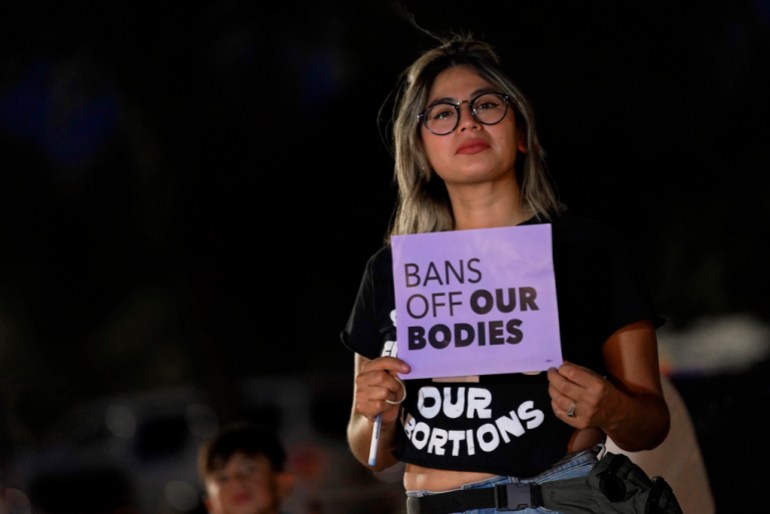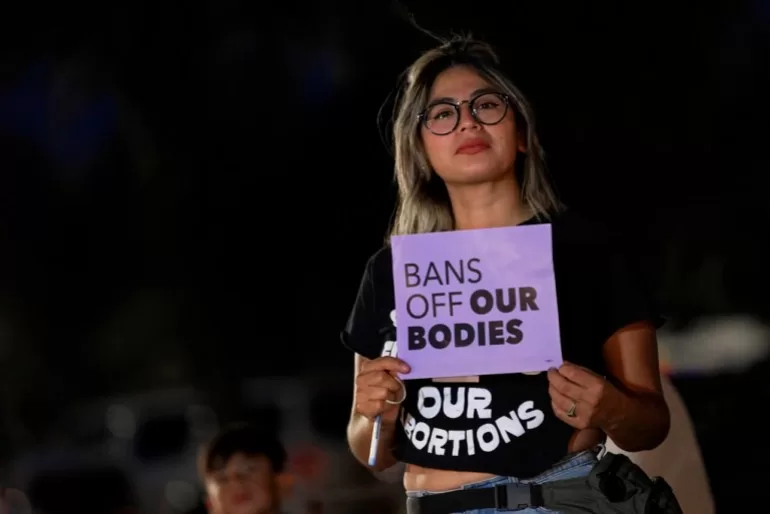Arizona’s Supreme Court has ruled that a 160-year-old law that places a near total ban on abortions may go back into effect in 14 days.
The court, which ruled 4-2 in favour of reinstating the 19th-century statute, declared on Tuesday that it is now “enforceable”.
“Physicians are now on notice that all abortions, except those necessary to save a woman’s life, are illegal,” it said.
The 1864 ban, introduced before Arizona even became a state in the United States, outlaws abortion from conception with no exceptions, even in cases of rape or incest.
Here’s everything you need to know about the ruling, which is expected to have far-reaching effects, impacting both women’s healthcare and US elections in November.
What does the law say?
The law was originally passed decades before Arizona became a state in 1912. But it had lain dormant after the US Supreme Court legalised abortion across the nation in the 1973 Roe v Wade court ruling.
The US Supreme Court overturned the Roe decision in a 2022 ruling. Supporters and opponents of abortion rights alike have since been engaged in legal battles over whether Arizona’s 1864 law could be enforced.

This week’s ruling follows legal action brought by obstetrician Eric Hazelrigg, who runs pregnancy centres counselling women against having abortions, and Republican Yavapai County attorney Dennis McGrane. The pair were supported in their bid to revive the 19th-century ban by the Alliance Defending Freedom, a conservative legal group.
The law orders prosecution for “a person who provides, supplies or administers to a pregnant woman, or procures such woman to take any medicine, drugs or substance, or uses or employs any instrument or other means whatever, with intent thereby to procure the miscarriage of such woman, unless it is necessary to save her life”.
This indicates doctors could now be prosecuted in the state in the US Southwest although the justices stopped short of saying this outright.
What are the implications of this law?
The law does not come into effect for another two weeks, meaning that lawyers still have a chance to raise any remaining objections or legal issues at a lower court, a process that is expected to lead to further delays in its implementation.
Assuming the law does eventually come into effect, it is unclear how it would work in practice. Theoretically, doctors breaking the law could be fined or face from two to five years in prison for providing abortion services. While the law does not specifically target women, there has been no clarification on whether women themselves could be prosecuted for seeking abortions in the future.
But Kris Mayes, Arizona’s Democratic attorney general, has promised not to prosecute doctors or women, a position that could be challenged by local prosecutors and abortion opponents.
Under a near total ban, the number of abortions in Arizona is expected to drop drastically from the roughly 1,100 currently carried out each month, according to estimates from the Society of Family Planning, a nonprofit organisation.
Planned Parenthood, which provides abortions and other healthcare services, pledged to continue providing abortion services until the law goes into effect. If clinics in the state are shuttered, women would be forced to travel to other states for services.
What are the reactions?
Immediately after Tuesday’s ruling, Mayes called the 1864 ban “unconscionable and an affront to freedom”.
“Today’s decision to reimpose a law from a time when Arizona wasn’t a state, the Civil War was raging and women couldn’t even vote will go down in history as a stain on our state,” she said in a statement.
The decision made by the Arizona Supreme Court today is unconscionable and an affront to freedom. pic.twitter.com/swEqJREVVS
— AZ Attorney General Kris Mayes (@AZAGMayes) April 9, 2024
“In Phoenix, we believe abortion is health care,” Phoenix Mayor Kate Gallego, also a Democrat, said on the social media platform X. “Women – not courts or politicians – get to decide if, when, and how to start a family.”
In Phoenix, we believe abortion is health care.
Women—not courts or politicians—get to decide if, when, and how to start a family. That’s why the Council and I worked with our police chief to deprioritize response to abortion law violations in 2022. This policy still holds. https://t.co/yiHegWytK8
— Mayor Kate Gallego (@MayorGallego) April 9, 2024
California Governor Gavin Newsom posted on X that his state, which borders Arizona, “remains ready to help Arizonans access reproductive health care”.
Abortion rights supporters are collecting signatures to try to put a measure on November’s ballots in Arizona that would give voters a say on whether reproductive rights should be enshrined in the state’s constitution.
They have proposed an amendment that would guarantee abortion rights until a fetus could survive outside the womb, typically around 24 weeks. It also would allow later abortions to save the mother’s life or to protect her physical or mental health.
How will this affect November’s presidential election?
As Americans prepare to elect a president in November’s elections, abortion rights are set to become one of the biggest battlefields, not just in the swing state of Arizona, but across the country.
President Joe Biden, whose re-election bid could be boosted by the backlash to recent abortion restrictions, called the Arizona ruling the “result of the extreme agenda of Republican elected officials who are committed to ripping away women’s freedom”.
“Millions of Arizonans will soon live under an even more extreme and dangerous abortion ban, which fails to protect women even when their health is at risk or in tragic cases of rape or incest,” he said in a statement.
Republican presidential candidate Donald Trump, who has flip-flopped on the issue, said on Monday that access to abortion should be determined by individual states, stopping short of proposing a national ban that could imperil his chances with voters in swing states like Arizona.
“President Trump’s retreat on the Right to Life is a slap in the face to the millions of pro-life Americans who voted for him in 2016 and 2020,” said his former vice president, Mike Pence, an evangelical Christian who helped him woo the religious right in his 2016 election victory.
On his social media platform, Truth Social, Trump called on his disgruntled anti-abortion rights allies to “get on with helping Republicans to WIN ELECTIONS, rather than making it impossible for them to do so!”
He added: “Many Good Republicans lost Elections because of this Issue.”
